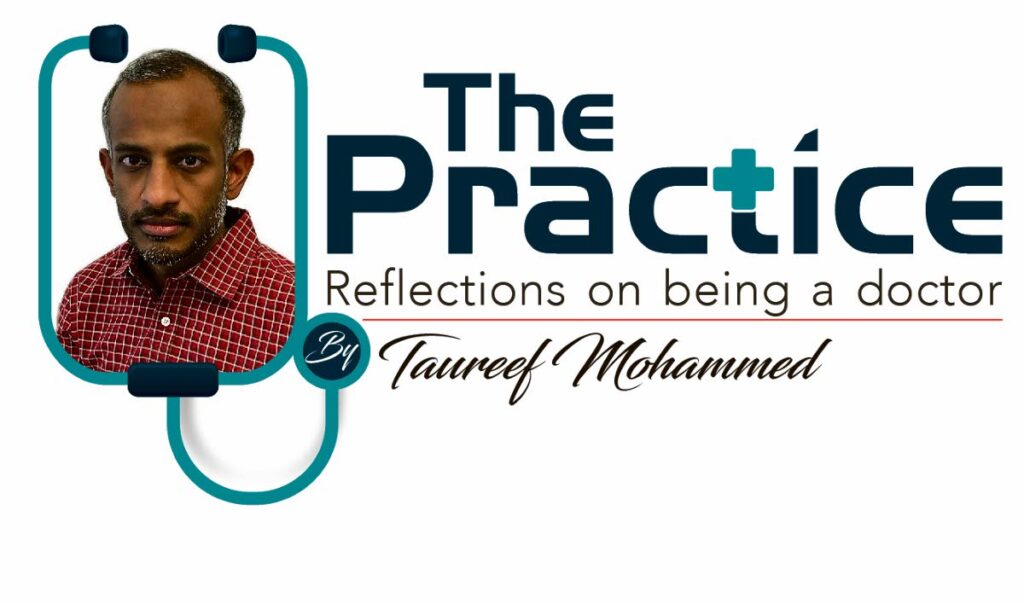When medicine is a business: ‘What you go do?’

TAUREEF MOHAMMED
“HE CHARGED me $1,500 and he ent even spend ten minutes with me. He didn’t even touch me or examine me.”
Almost instantly, the exasperation turned into indifference: “But what you go do? You have to pay.”
The customer had just been discharged from a private hospital in TT, where he had been admitted for dizziness.
His dizziness had resolved overnight, and the following day the attending doctor said he would most likely be discharged but wanted a cardiologist to clear him first, as dizziness could sometimes be a sign of heart problems. The cardiologist cleared him before he could blink twice – “nothing is wrong with your heart” – and sent him on his way.
When the customer saw the hospital bill, he wondered if the cardiologist’s heart was good. He didn’t mind the $4,000 for the MRI scan of the brain – it was important to ensure he did not have a stroke. He did not mind the $2,500 that the attending doctor charged – the attending doctor had listened to, examined, diagnosed, treated, and discharged him. He probably would have paid the attending doctor more if he had asked.
But $1,500 for doing nothing, the customer thought, felt like a rip-off. He wanted a refund, but healthcare was not a commodity, although that was exactly how he felt.
“You have to pay.”
Practising medicine in the private sector is a slippery slope – it has always been. Some argue that the slope should not even exist – that private healthcare is an abomination – but that is a different story.
Regardless, private healthcare exists, which means doctors are required to straddle practising medicine and running a business. And anyone who thinks that that is easy to do, that the two are somehow synonymous and fit like yin and yang, is a fool.
Take the doctor who proclaimed, quite proudly, on a hospital ward, in front of the nurses’ station: “I am a doctor and businessman.”
If he had said he was a doctor, that he had studied for many years, and had a valuable skill, and deserved to live a comfortable life, most people would get it.
If he was referring to his practising medicine and running a restaurant on the side, then good for him – but he wasn’t.
Instead, he was referring to his savvy ability to run his medical practice as a business, showing off his rapid patient turnover to the nurses, who were probably all rolling their eyes. Of course he drove around in a car easily worth more than half a million dollars.
He was not an entrepreneur or an astute businessman or a good doctor. He was a fool. Making money off sick people was not something to announce or boast about – only a fool would do that.
But the brazen doctor’s words simply highlighted the reality: in the private sector, practising medicine is a business: patients are customers. More customers, more money. It is solely up to the doctor – not the government, not the private institution, not the medical authorities – to choose whether he/she wants to be seen as a doctor or a businessperson.
Despite the regulations, the audits, the standard fee schedules in some jurisdictions, the choice remains solely the doctor’s. And whatever choice the doctor makes, he/she can, in most cases, get away with it, unscathed. With a “Dr” in front of your name and a stethoscope around your neck, as long as you do what patients expect you to do – and businessmen (doctors) know exactly what customers (patients) expect – it is not difficult to pretend to practise medicine while you run a multi-million-dollar business.
Was the cardiologist a businessman? Is it fair to charge a patient $1,500 for a consultation that takes less than ten minutes? Is it fair to charge $1,500 when you have not even touched the patient?
In Ontario, Canada, a limited cardiology consultation, which is what this sounded like, is valued at CAD$105 (TT$525); a standard cardiology consultation is set at about CAD$160 (TT$800); and a comprehensive cardiology consultation (which requires a minimum of 75 minutes of direct patient contact) is valued at CAD$310 (TT$1,555). But forget Canada.
The doctor did not do what he was expected to do, and the patient gave the verdict. The doctor-patient-businessman-customer relationship was a non-negotiable one, though, so the customer had to pay.
“What you go do?”
Taureef Mohammed is a physician from TT working in Canada
E-mail: taureef_im@hotmail.com

Comments
"When medicine is a business: ‘What you go do?’"